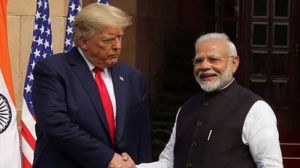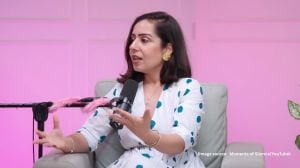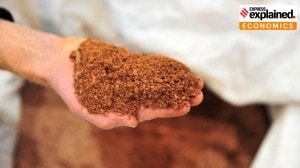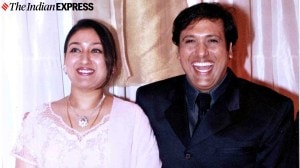CEC Lyngdoh gets Magsaysay for standing up to J&K militants and Modi
The normally stern James Michael Lyngdoh, who’s preparing to conduct his last elections in November as he demits office of the Chief El...

The normally stern James Michael Lyngdoh, who’s preparing to conduct his last elections in November as he demits office of the Chief Election Commissioner in February 2004, was all smiles today when news came in that he had been awarded this year’s Ramon Magsaysay award for government service.
The choice of the words in the citation from Manila—the award will be given on August 31—were significant. They praised Lyngdoh for his ‘‘convincing validation of free and fair elections as the foundation and best hope of secular democracy in strife-torn India.’’
For Lyngdoh himself—the second CEC to get the award after the mercurial T N Seshan—these words meant how under his leadership, the commission had withstood all pressure in the conduct of polls in Gujarat and Jammu and Kashmir.
In Gujarat—after a thousand died in the riots—it was Chief Minister Narendra Modi, his staunch ally Arun Jaitley and the VHP who took regular potshots at him when he made it clear that he wouldn’t hold elections until the riot victims felt more secure.
Modi, in fact, made it a point to spell out his ‘‘Christian name,’’ thereby alleging a proximity to Sonia Gandhi. The ugliness was checked only when Prime Minister A B Vajpayee stepped in.
In J&K, however, pressure came from terrorists bent to derail the poll process—unleashing a vicious cycle of violence in which several political workers were killed and candidates targeted. He allowed foreign diplomats into the state and they vouched for the transparency of the elections.
He also ensured that surrendered militants enrolled in the local police force were not at large on the day of polling. There had been widepsread apprehension in the Valley that they would be used to rig the polls. Lyngdoh insisted on an attendance roll call in the barracks to which they were sent on polling day.
In effect, Lyngdoh and his team ensured a free and fair poll in both states, the process in Jammu and Kashmir getting international legitimacy and robbing Pakistan of most propaganda points.
‘‘We got our credibility in Jammu and Kashmir from (the way we handled the polls in) Gujarat, and we began to be given tremendous respect in Kashmir. Then I started having some hope. Otherwise the picture had been gloomy,’’ he said.
More recently, Lyngdoh took on Madhya Pradesh Chief Minister Digvijay Singh for not suspending six officials who were held responsible for publishing faulty electoral rolls.
Speaking of the ‘‘unfinished’’ tasks that lie ahead, Lyngdoh said, ‘‘Electoral rolls in most of the country are not what they should be and this is a huge task before us. The trouble is that everyone wants to cheat.’’
The unusually candid Lyngdoh said that the worst states in terms of electoral malpractices were UP, Bihar and Tamil Nadu. As for a model state, he could not think of any, he said.
He also had harsh words for politicians. Explaining the reasons why the EC was able to function autonomously, he said, ‘‘If you get too close to politicians, you are bound to become corrupt. It’s like getting cancer. One is no longer a bureaucrat when in the Commission. Here you are a Constitutional authority, you work according to your conscience.’’
Asked if the Magsaysay Award was a vindication of his stand on Gujarat, Lyngdoh replied, ‘‘Could be. Some people will see it that way.’’ When asked what he felt about the manner in which records were being fudged and the accused allowed to get away, the CEC replied, ‘‘As a citizen I don’t feel reassured.’’
When his attention was drawn to the wording of the citation and to his contribution specifically to ‘‘secular democracy,’’
Lyngdoh said: ‘‘The French government has invited me to a seminar in Paris in October. The subject is Religion and Politics in Asia, past and present. That is another way of saying secularism. There is the classical concept of secularism, that state and religion must be kept separate. The India concept is to equate all the religions. Conceptually I find it difficult to digest the second definition.I have still to see even parents who can treat all their children equally.’’





- 01
- 02
- 03
- 04
- 05


![Kadapa, [Andhra Pradesh], 27 May (ANI): Andhra Pradesh Chief Minister N Chandrababu Naidu and state Minister Nara Lokesh in conversation during the Telugu Desam Party's (TDP) annual three-day Mahanadu conclave, in Kadapa on Tuesday. (ANI Photo)](https://images.indianexpress.com/2025/05/tdp.jpg?w=400)





![Kadapa, [Andhra Pradesh], 27 May (ANI): Andhra Pradesh Chief Minister N Chandrababu Naidu and state Minister Nara Lokesh in conversation during the Telugu Desam Party's (TDP) annual three-day Mahanadu conclave, in Kadapa on Tuesday. (ANI Photo)](https://images.indianexpress.com/2025/05/tdp.jpg?w=300)

















